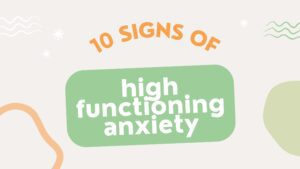Ever thoughts you had anxiety but also feel like you get a lot done during your day? You’re not alone! There are plenty of people who have what is known as high functioning anxiety. People with high functioning anxiety can often get work done and be an active participant in their daily activities. However, they are also at high risk of stress and burnout.
Are you curious if this may apply to you? In this article, we are going to review ten common signs of high functioning anxiety, what to do to assist with those symptoms, and then next steps to get a formal diagnosis if you think you may have high functioning anxiety.

1: Overthinking/Overanalyzing
Do you ever find that when you have things to do you either overthink of overanalyze it? That is common with high functioning anxiety. Perhaps it is because you want to get what you need to done perfectly, or you are afraid others will judge your work. If you find yourself constantly thinking about how to get something done, or what the potential outcomes can be, then this symptom probably applies to you.
To cope with overthinking and overanalyzing, the goal is to go for “done, not perfect.” Oftentimes, getting things done, even with mild errors, is significantly better than not getting something done in full at all. This also consists of accepting things as they are, including the potential for human error.
One exercise that you can practice is set limits on how long you work on or plan for something. Set a timer, get work done, and then stop when the timer goes off. If you genuinely have more work to do, take a break and repeat this exercise. If you are done, give it a quick edit at a later point and then move on with your day.
2: People Pleasing
People pleasing happens when you compromise yourself for the satisfaction or happiness of others. This can happen when you say yes to something you don’t want to do or do not have time for, or pivoting from your ideas and opinions for the sake of making someone else happy.
This falls under high functioning anxiety because despite the fear of how the other person will react, you can still go about your day and do what is needed to please the given person.
To work on this sign of anxiety, practice saying no more often. Whether that’s running an errand for someone else, taking on another project, or disagreeing with someone else, practice saying no and expressing your perspective. You may just find that the person you are afraid to let down still has the same respect and dynamic with you!
3: Nervous Habits
Nervous habits include fidgeting, nail biting, and hair pulling. Different from other diagnoses, like OCD, in high functioning anxiety, these habits do not stop you from getting what you need to done.
To practice working on this sign of high functioning anxiety, try not engaging in the habit for small periods of time and build up. For example, if you want to bite your nails, can you wait thirty seconds? And then another thirty seconds? Eventually, can you spread out those increments to one minute? Two?
4: Fatigue
As a result of feeling anxious, or constantly being on the move or engaging in nervous habits, you will probably feel fatigued.
To manage your fatigue, you can implement two strategies, that while seemingly contrary, actually work well with each other. First, you want to make sure you are actually getting enough rest. Are you sleeping around eight hours a day? Not consuming too much caffeine or sugar? You are going to want to make sure you are taking care of your rest and health first. If these are in control, then what you will want to do is engage in activity is a healthy way instead of nervous energy. Find ways to move your body that work well for you. Whether that is walking, biking, or going to the gym, you want to move your body to get your energy flowing and away from anxious energy.
5: Comparison
Do you find yourself comparing your work and character to others? This often happens in high functioning anxiety because of perfectionism, which we will get to in a moment, and people pleasing, as we previously discussed. Comparison may not take too much time out of your day, but it can be extremely exhausting to do.
In alcoholics anonymous, they use the expression “compare and despair.” This expression is also used in psychology as a whole. To begin to work on comparison, begin to reduce your opportunities to compare yourself to others. Can you mute certain social media accounts? Do you have to inquire on other people’s projects in your field? Can you leave some topics off the table with your peers?
6: Difficulty Relaxing
As a result of the nervous energy, you will probably find that it can be difficult to relax. Not only can this affect obvious areas of your life, such as sleep, but it can also impact your ability to concentrate. This can impact your professional and personal life.
When you find yourself having difficulty relaxing you can try two different things. One is practicing your breathwork to regulate your body and relax. This can be done through meditation or other guided breathwork activities. The other strategy which you can try is to engage with the present moment through your senses. What can you see, smell, touch, and hear? If you have food or a beverage, can you taste it slowly?
7: High Achieving (Possibly Burning Out)
People with high functioning anxiety often are very high achievers. While this may sound like a positive attribute for productivity, in excess, it can lead to burnout. For example, have you ever had a big project, work very hard, and then got sick after it was over? This is not uncommon with high achievers.
To combat this sign, try setting reasonable deadlines for projects. Don’t pick the shortest deadline you can for the sake of impressing others. Instead, give yourself time to work at a pace that feels reasonable and allows for you to not feel pressure. This will not only positively impact the quality of your work, but it will promote positive health and wellbeing.
8: Perfectionism
As mentioned previously, people with high functioning anxiety often are striving for perfectionism. The downside is it can lead to burnout trying to meet potentially unrealistic expectations of themselves.
Just like with overthinking/overanalyzing, the goal is to get to “done, not perfect.” Scroll back up to review how to implement this strategy!
9: Appears Outwardly Calm
People with high functioning anxiety will often appear calm and collected. Yet internally, they may feel intensely overwhelmed and anxious. Bottling up emotions is not the best way to handle and process emotions.
In order to combat this, practice expressing how you feel. You may find it is difficult to express these emotions verbally to others, and that is okay. If you find it is difficult to verbally express your emotions, try journaling them out! By writing down your feelings, you can keep them confidential to yourself, but you are also outwardly expressing how you are feeling (and not bottling them in!).
10: Plans Often
The last sign of high functioning anxiety we are going to review is that you may find yourself planning often. While there is nothing wrong with making plans, it may be very anxiety provoking if the plans do not happen the way you originally intended.
To navigate planning, try making a plan with the understanding that it may not happen exactly how you intend. This is a great way to practice acceptance.
Next Steps
Now that we have reviewed the signs of high functioning anxiety, how are you feeling? If you are considering that you may have high functioning anxiety, we would be happy to assist you in diagnosing and navigating the anxiety!




Leave A Comment